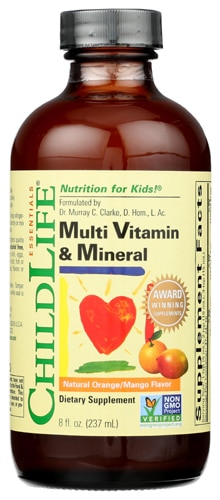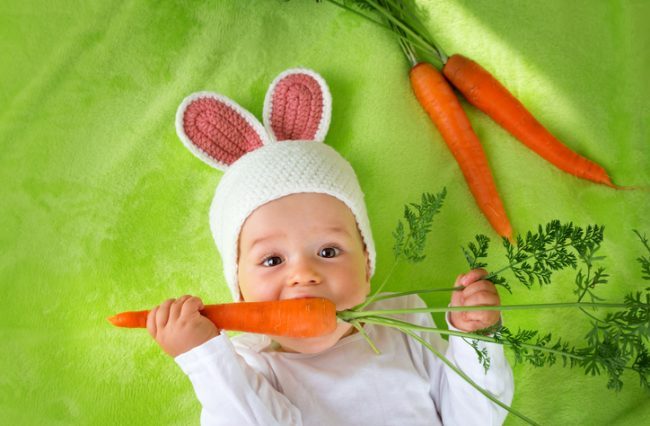If you’re a vegan, you’re well aware of the benefits of a vegan diet. Among other things, vegans tend to have lower cholesterol, lower blood pressure and a lower risk of heart disease, according to the American Journal of Clinical Nutrition.
But is what’s good for an adult also good for a baby? Opinions differ.
A paper published recently in the Journal of Pediatric Gastroenterology & Nutrition notes that a vegan diet generally has been discouraged during what’s known as “complementary feeding,” when breast milk alone cannot meet a baby’s nutritional needs. However, the authors of the paper maintain that a vegan diet can work under strict “medical and dietetic supervision.” If a vegan diet lacks such supervision, a baby can suffer irreversible cognitive impairment or even can die, the paper warns.
Registered dietitian Diana K. Rice, author of The Baby Steps Dietitian, says a vegan diet is “completely safe” for a baby as long as it’s well-planned and the child’s health care providers are aware of it.
“Well-planned vegetarian and omnivorous diets are, of course, healthy as well, so I see a vegan diet as a personal preference of the family rather than the most ideal dietary choice,” Rice says.
The Academy of Nutrition and Dietetics and the American Academy of Pediatrics also endorse well-planned vegan diets for infants and toddlers.
If you do choose a vegan diet for your baby, you and your pediatrician should monitor the child for nutrient deficiencies, particularly iron, calcium and vitamin B-12, she says. Furthermore, according to the American Journal of Clinical Nutrition paper, close attention must be paid to a vegan baby’s protein intake. Tofu, soy and bean products are recommended as protein sources.
Rice cautions that aside from being on the lookout for nutrient deficiencies, a parent who picks a vegan diet for a baby must be prepared to face criticism.
“Many people you encounter won’t understand that a vegan diet can be healthy for children — or adults, for that matter — and may offer up unsolicited opinions,” she says.
Another caveat from Rice: A vegan diet could take more forethought and, therefore, could heighten a parent’s stress. For instance, she says, a parent whose baby is a vegan must fret about where to eat while traveling.
While Rice backs the idea of a baby eating a vegan diet, holistic nutritionist Kristi Acuna steadfastly opposes the notion.
“Vegan diets do not have the vitamin A and D in the form of animal fat that a baby needs for their bodies to convert and utilize vitamin A,” Acuna says. “There are no pros about a baby being fed a vegan diet.”
Vegan diets, she adds, usually are chock-full of over-processed wheat and GMO corn products.
On the flip side, Tory Tedrow, the in-house registered dietitian nutritionist at ContentChecked, a developer of health apps, says vegan diets rely heavily on fruits, vegetables and whole grains, which are good sources of an array of vitamins and minerals. By the same token, she says, those same fruits, vegetables and whole grains also are high in fiber, which can cause babies to feel full too quickly, making it harder for them to consume an adequate amount of calories.
If you do decide to put your baby on a vegan diet, that could set a positive course for your child’s lifelong eating habits. According to the Physicians Committee for Responsible Medicine, kids raised solely on fruits, vegetables, whole grains and legumes grow up to be slimmer and healthier than their meat-eating peers and even live longer.
“Vegan diets with appropriate supplements can support normal growth and development,” according to the paper published in the Journal of Pediatric Gastroenterology & Nutrition.
On the PETA Kids blog, Amy Snyder chronicles the introduction of her infant son Dylan to a vegan diet. She says raising a child as a vegan isn’t as complicated as some people might lead you to believe.
“Babies need lots of love and care during their first year, but there are only a few areas of their early life that you need to veganize,” Snyder writes.
Snyder points out that breast milk already is vegan, as is soy-based baby formula. Additionally, she says, a baby’s first foods typically are fruits, vegetables and rice cereal — all of which are vegan.
In the end, if your tot enjoys a cornucopia of vegan foods, “you may find that he or she has a healthier and more varied diet compared to children accustomed to the standard American diet,” Rice says.




